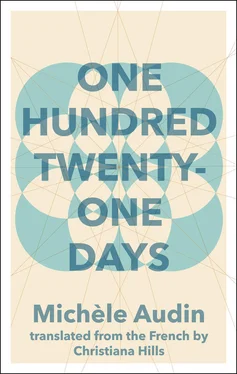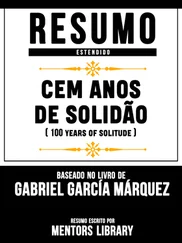Michèle Audin - One Hundred Twenty-One Days
Здесь есть возможность читать онлайн «Michèle Audin - One Hundred Twenty-One Days» весь текст электронной книги совершенно бесплатно (целиком полную версию без сокращений). В некоторых случаях можно слушать аудио, скачать через торрент в формате fb2 и присутствует краткое содержание. Год выпуска: 2016, Издательство: Deep Vellum Publishing, Жанр: Современная проза, на английском языке. Описание произведения, (предисловие) а так же отзывы посетителей доступны на портале библиотеки ЛибКат.
- Название:One Hundred Twenty-One Days
- Автор:
- Издательство:Deep Vellum Publishing
- Жанр:
- Год:2016
- ISBN:нет данных
- Рейтинг книги:3 / 5. Голосов: 1
-
Избранное:Добавить в избранное
- Отзывы:
-
Ваша оценка:
- 60
- 1
- 2
- 3
- 4
- 5
One Hundred Twenty-One Days: краткое содержание, описание и аннотация
Предлагаем к чтению аннотацию, описание, краткое содержание или предисловие (зависит от того, что написал сам автор книги «One Hundred Twenty-One Days»). Если вы не нашли необходимую информацию о книге — напишите в комментариях, мы постараемся отыскать её.
's Best Summer Books 2016. "Formally dazzling, playful and affecting, a new Oulipian classic." — Lauren Elkin, author of
and
This debut novel by mathematician and Oulipo member Michèle Audin retraces the lives of French mathematicians over several generations through World Wars I and II. The narrative oscillates stylistically from chapter to chapter — at times a novel, fable, historical research, or a diary — locking and unlocking codes, culminating in a captivating, original reading experience.
Michèle Audin
One Hundred Twenty-One Days — читать онлайн бесплатно полную книгу (весь текст) целиком
Ниже представлен текст книги, разбитый по страницам. Система сохранения места последней прочитанной страницы, позволяет с удобством читать онлайн бесплатно книгу «One Hundred Twenty-One Days», без необходимости каждый раз заново искать на чём Вы остановились. Поставьте закладку, и сможете в любой момент перейти на страницу, на которой закончили чтение.
Интервал:
Закладка:
At the end of November, the news finally came that the 2nd Armored Division had liberated Strasbourg. Two days later, in Paris, during the formal ceremony marking the beginning of the new academic year at the Sorbonne, Mireille heard a reading of the “Song of the University of Strasbourg,” a poem Aragon had written the previous year. But the professors and students from Strasbourg who had been arrested were still being held in Germany. It’s over, the Silberbergs are going to come home, thought Mireille as she moved one of her little flags, I’m going to write to Clara. But she didn’t.
In December, the German army regained the offensive in the Ardennes. On the map, the space occupied by Nazi flags wasn’t shrinking very much. Maybe it wasn’t really over. After the dead leaves, after the rain, Mireille spent hours watching the snow fall from the top of her windows onto the deserted paths of the Luxembourg gardens. The fog was freezing onto the windowpanes. She would examine the delicate forms of the tiny frost crystals, trying to imagine what André would have said if he had been there to look at them with her. She would remember the words he had used to talk about numbers, his jokes about the inverse powers of 2, like 1/2, 1/4, 1/16 Jewish blood: “Ah, you’re only half Jewish, 1/2 for you, 3/4 for me, that would make 5/8 for our children, and a great fractions exercise!” He would say words like “symmetry” and “star,” we would laugh together about a delicate six-pointed star composed of solid water frozen on a window. But André wasn’t there. Where had they taken him? she wondered as she scrutinized the map.
When January began, it had already been snowing for two weeks. People celebrated the new year as best as they could. It would be the year of victory and, in expecting victory, everyone could tighten their belts a little more. Once again, Strasbourg was under threat. But after the blue, white, and red flags of the Allies finally signaled the defeat of the Germans in the Ardennes, then in Strasbourg, other little red flags far to the east responded: the Russian army entered Warsaw.
Seated in the middle of the crowd of students gathered in the seats of the big lecture hall, Mireille attended another ceremony, over which de Gaulle himself presided, that officially marked the liberation of the university. It was so cold in Paris that Mireille spent whole days in January in her coat and gloves working underground in the metro, where the temperature was more tolerable than in the university library. The winter was even worse in the east, according to the newspapers, which were being printed on a single sheet because of the paper shortage.
The little red flags cleared the Oder on January 31st, then, on February 14th, the blue, white, and red flags of the Allies crossed the Rhine. Snippets of unbelievable information started to arrive about the camps the Red Army had liberated in Poland. The war was soon finished, German cities were being bombed, Dresden had been reduced to ashes, and, at the beginning of March, the Allies’ flags arrived in Cologne. Finally, a big city, a symbol. Standing at her window, Mireille watched the park’s bare trees while thinking about the big gothic dome reflected in the Rhine, an image from one of Heine’s poems. Two years already, she realized. It was on the 23rd of February, 1943, that she had first seen André.
In March, Mireille went back to Strasbourg for the first time. It was, she would think to herself even long afterwards, the coldest day of her entire life. The harsh winter wasn’t over yet. She had left the train station and asked for directions; she remembered the name of the street, since André had told her about his parents’ shop and she remembered every word he had said to her. It wasn’t too far. She entered the Silberberg’s store, with the book she wanted to return to them, which was wrapped in an old newspaper, clasped tightly to her chest.
“ Bonjour , Madame,” she had said. “Do you remember me? I’m one of André’s friends.”
“Not at all,” André’s mother replied after having looked her up and down. “We don’t know you.”
And because Mireille was about to protest, give her name, explain herself:
“This is a store, we have work to do. Go away!”
And she had turned her back on Mireille. Out on the street, the wind stung her like another slap in the face. Of course she recognized me. At Clermont, André had asked Clara to invite Mireille over to their house. Clara hadn’t been very happy about it, but she had done it anyway, she always did what her brother asked her, and she had introduced Mireille to her parents — that was in April of ’43, two months before André had been arrested. And now his mother was refusing to speak to her. But why? That’s what they call rejection. She would not be hearing anything from André’s parents. Mireille took a train back home, put the Inferno in her bag — the book with the dedication to André and Daniel Roth’s signature inside. Back in Paris, she wrote to Clara, who had been her friend, and with whom she had taken Professor Schmitt’s course at Clermont-Ferrand on the Alsatian humanists. Clara didn’t write back.
In April 1945, everyone knew it really was the end this time. The little flags finished covering the map of Europe, with red ones around Berlin, then, on April 24th, red ones in Berlin. It was over. Vichy France was declared null and void, the head of the so-called “French State” arrived in Vallorbe, on the Swiss border, then was brought back to France, where he would be put on trial. As for Hitler, he wouldn’t be — he had committed suicide.
What a marvelous month May was! Once more like in one of Heine’s poems, all the buds were bursting. The most beautiful day of our lives, everyone kept saying. The war was over. Everyone went to the Champs-Élysées again to watch the military victory parade. They’re going to come back, thought Mireille. In the flowering Luxembourg gardens, in front of the old edifice of the Sorbonne, on the Boulevard Saint-Michel, on the banks of the Seine, people strolled, hummed, smiled at strangers. As she walked down the boulevard on her way to class, Mireille looked at the beautiful books in the windows of the secondhand bookstores. Hardbound law books, some of which might have belonged to her father. Books on mathematics. Stolen from whom? she wondered. The German bookstore on the Left Bank had closed, the florist who had employed Mireille for a few months during the occupation had reopened his kiosk, it was a time to give flowers, and business was good, even without those arrogant Germans who showed up in June 1942.
With the war over, the prisoners of war were starting to arrive at the Gare du Nord station. It was a time not to die, as the poets would say. But the extermination machine was well underway and continuing to kill, even killing poets, even the night watchman of Pont-au-Change, with exhaustion, disease, typhus.
A few of the surviving deportees were also starting to return.
In the month of June, Mireille, who was shy and reserved by nature, but determined nonetheless, went to wait for Henri Pariset at the end of one of his classes. André had told her all about his professor, but since Pariset had been appointed to Paris in 1940, he had already left Clermont when she got there, so she had never met him. She arrived well in advance and waited for a long time in the hallway of an institute on Rue Pierre-Curie. Through the door to the lecture hall came words she didn’t understand. From time to time, groups of men having discussions, probably mathematicians, would pass by, looking at her for a moment, then returning to their conversation. The gaze of one of the men — who had a red lock in his graying hair and wore a leather mask, as well as the somber clothes and black armband typical of someone in deep mourning, which didn’t keep him from laughing very hard — frightened her. Only a woman with a typewriter in her arms stopped to ask Mireille if she needed any help. She was the one who pointed out the hidden door where the professor would come out. Finally, there was the sound of commotion, seats slamming back up: the class was over. Pariset came out, with a little chalk on his nose and a lot on his sleeves. She approached him, introduced herself, and said she was a friend of André Silberberg’s. He took the sad girl to a café on Rue Saint-Jacques, listened to what she had to say, guessed without much effort what she wasn’t saying, confirmed that André had been sent to a camp in Upper Silesia, was a little surprised that she didn’t know that already, since the Silberberg family had been informed, but didn’t comment on it. He said that he had written letters to André and that the first letter he had received was a piece of paper André had thrown off the train as it was leaving Drancy. Mireille lowered her eyes to her glass of grenadine and he saw by this that she had received one, too.
Читать дальшеИнтервал:
Закладка:
Похожие книги на «One Hundred Twenty-One Days»
Представляем Вашему вниманию похожие книги на «One Hundred Twenty-One Days» списком для выбора. Мы отобрали схожую по названию и смыслу литературу в надежде предоставить читателям больше вариантов отыскать новые, интересные, ещё непрочитанные произведения.
Обсуждение, отзывы о книге «One Hundred Twenty-One Days» и просто собственные мнения читателей. Оставьте ваши комментарии, напишите, что Вы думаете о произведении, его смысле или главных героях. Укажите что конкретно понравилось, а что нет, и почему Вы так считаете.












